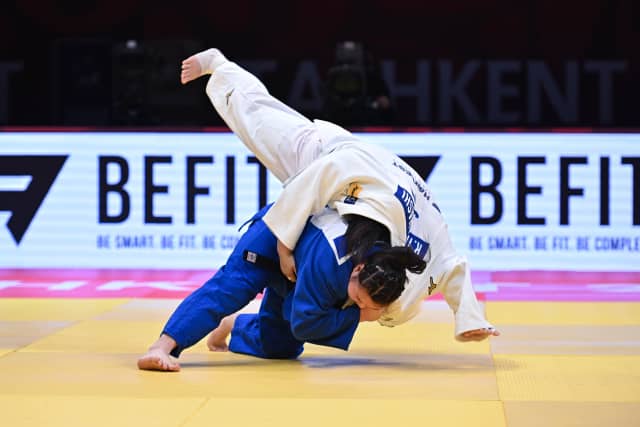"The first thing to talk about is the prevalence of domestic rivalries on the World Judo Tour at the moment. France seems to have settled theirs with the -78 kg place and Japan has now completed their team selections for the Games but other nations have yet to make their final decisions and so we benefit from that highly competitive energy at every competition. We have had many occasions to study the Deguchi vs Klimkait battle but they were not here this time. On heavyweight day in the Humo Arena we found the situation between Wagner and Boehm of Germany most interesting. They had to fight each other for bronze and that brought a lot of tension, Wagner handling it better. Adamian (AIN) and Kanikovskiy (AIN) were also interesting, although Kanikovskiy appears to be getting better all the time, overtaking Adamian by both ranking and performance. At only 22 it is exciting to think about what Kanikovskiy might be able to achieve in the years to come."
"Rivals keep fighting hard for results and so they get better and better and therefore the standard against the others is also better. By chasing each other so strongly they improve their quality a great deal and we can see this clearly with the two German women both near the top of the rankings just as the Canadians are at -57 kg.
It’s difficult though because to continue competing so often brings tiredness and a lack of specific Olympic preparation. They are having to focus on making weight, travel and more and this interrupts much-needed periods of development and physical training. Seeing how the level goes up and down between one event and the next, athletes’ abilities being sometimes inconsistent from week to week, competition by competition, it is hard for them to maintain their best level."
"The German head-to-head may feel extreme to them but actually how they win and lose against each other is not necessarily indicative of who is better or who will beat the best at the Games. Different countries have different ways to select their Olympic teams and ultimately the test won’t be understood fully until this summer in the French capital.
I really like seeing the attitude of some athletes who came close but in the end were not selected to go to the 2024 Olympic Games. The French women are an excellent example of this. Posvite at -78 kg and and Fontaine at +78 kg fought with heart today. They are continuing to improve, to develop themselves and their judo. They know that this summer’s big event isn’t everything. There are world events, continental events and future Olympics and perhaps even more importantly there is also life within this sport to be enjoyed."
"Next, on a more detailed technical note, I saw a great number of seoi-otoshi attacks being used by the heavier weights on this last day, using big movements to break balance and gain the right positions. That much movement is a sign of fitness and confidence. Su (CHN) was a perfect example of this, throwing in the opening seconds of the +78 kg final with seo-otoshi."
"The last point is for the home team. They were second in the medal table after day two and third at the end of competition. Uzbekistan had 7 athletes reach the quarter-finals of their respective men’s categories on day 3. With medals, in-catergory density and consistent performances across the team at most events, it shows their drive to win both at home, of course, and away. We are used to seeing their passionate team as they travel around the world, but they have as much quality as they do heart. There is a real combination of technical and physical excellence, spectator influence and the spirit of the judoka and the coaches driving Uzbekistan forward.”






